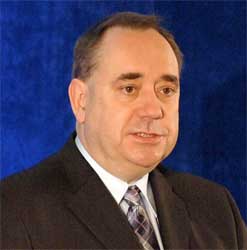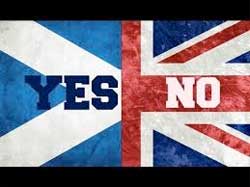EDINBURGH, UK: Young Scots aged between 16 and 17 are getting the vote in Scotland's independence referendum but the so-called 'selfie generation' looks set to reject separation.

Scottish National Party Leader Alex Salmond has fought had to lower the voting age to 16 but young Scottish voters to not seem to support his independence campaign. Image: Wikipedia
Alex Salmond's Scottish National Party (SNP), which is spearheading the campaign, fought hard to lower the voting age from 18 to 16 for the 18 September ballot, in anticipation of a youth vote.
Both sides have run slick campaigns on Facebook and other social media to get as many young people involved as possible. At least 80% of those eligible have registered to vote.
But while most teenagers might be expected to disagree with their parents, opinion polls suggest their views on independence from Britain are in line with older Scots, most of whom look set to reject the plan.
"People my age are very switched on and do want to listen to the issues but they're engaged with a politics that isn't about slander, the smear and the scaremongering," said Robbie Nicol, 16, a member of the Scottish Youth Parliament campaigning in an Edinburgh shopping centre to get teenagers to register.
"They're wanting to be involved in the politics that engages with them and talks positively about the issues. Talks constructively rather than indulging in mud-slinging," he added.
Pro-union camp ahead in opinion polls

Memes, Facebook, YouTube, Twitter and all sorts of other social media platforms are being used to reach young voters in Scotland. Image: [[http://www.makeameme.org MakeAMeme
Overall, most opinion polls currently give the pro-union camp between 45% and 50% of the vote, putting the pro-independence group into the 35% to 39% range.
Under-18s are thought to make up around three percent of those who can cast their ballots.
About 52% in that age bracket favour Scotland remaining part of the UK, according to a study by Edinburgh University researchers published in June, which has been one of the few to focus on young voters. This compared with 29% of teenagers backing independence and 19% undecided.
Louise Macdonald, Chief Executive of youth charity Young Scot, said the referendum was an incredibly important moment for 16- and 17-year-olds. "I would defy anyone to meet young people in Scotland and feel that they're apathetic, they're absolutely not," she said.
Realising they will not reach those who have grown up with the Internet through leaflets and public meetings, both the Yes and No camps have been running online campaigns tailored for young people.
YouTube, Facebook and Twitter

YouTube has been used extensively in the referendum for Scottish independence from the rest of Britain. Image: YouTube
One YouTube video by the SNP's youth wing shows an irritating neighbour visiting local teenagers and telling them where they are going wrong with activities like learning to drive and play the guitar.
"Imagine if 'can't do' became 'can do'," says the slogan at the end. "Independence offers us the chance to change so much."
The Facebook page for Better Together, the campaign that wants Scotland to stay in the UK, features memes which jibe at Salmond and has more than 160,000 likes.
According to Edinburgh University researchers about 67% of young voters have been following news of the referendum campaigns on social media compared with 63% for television and radio and 48% for online news websites.
As with adults, young people see the question of whether Scotland's economy would be stronger after independence as key to the debate. The Edinburgh team called this "the most important decision-making factor" but also highlighted the question of national identity.
Jan Eichhorn, a Fellow in Social Policy at the university who worked on the figures, said that for many young people who have access to such information, borders make less sense than than they for older voters.
"If you think about their national identity, they are somewhat more transnational," he said.
"What we find is that they are not less Scottish in their national identity, it's only about 10% that say I am more British than Scottish, but they are also less likely to favour their Scottish identity over their British identity," Eichhorn said.
If the polls are borne out, it could ironically be the youth vote which helps to preserve a system of union between Scotland and England which dates back more than 300 years.
Source: AFP via I-Net Bridge



















